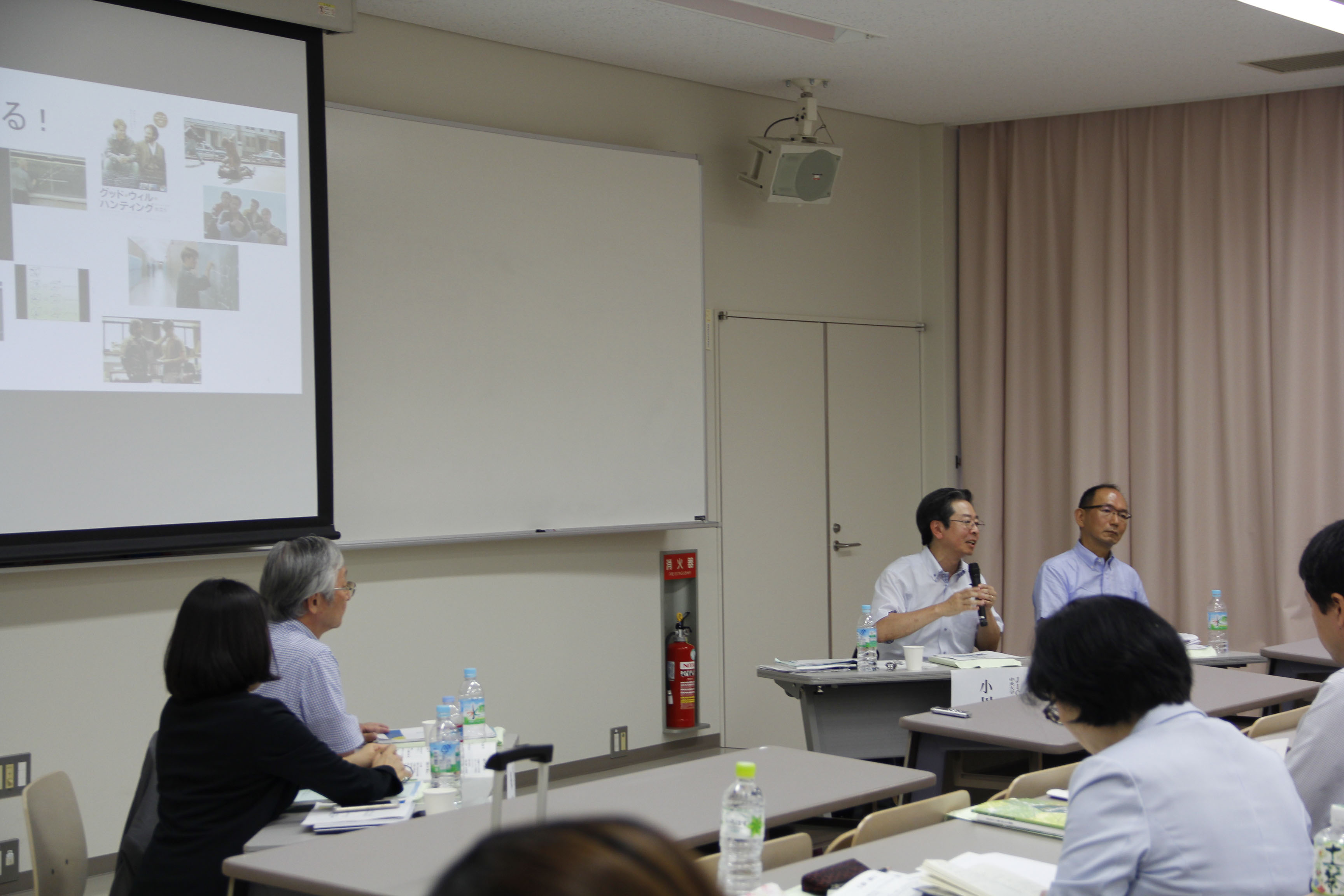Business Overview
In order to contribute to the development of higher education, we exchange information on the initiatives and research results of each university consortium.
Outline of the 13th National University Consortium Research Exchange Forum
- theme
- Developing Global Human Resources through University Collaboration
- Date
- Saturday, September 10, 2016 13:00-20:15 (Poster session 12:00-15:15)
Sunday, September 11, 2016 9:30 a.m. – 11:30 a.m. - Venue
- Forum and Poster Session: Elisabeth College of Music (about a 12-minute walk from the south exit of JR Hiroshima Station)
Information Exchange Meetings and Breakout Sessions: Hiroshima International University Hiroshima Campus (about a 10-minute walk from the south exit of JR Hiroshima Station, adjacent to the Elisabeth College of Music) - Co-organizers
- National Association of University Consortiums
Educational Network China - Contents
- The 13th National University Consortium Research Exchange Forum Leaflet

(Day 1)
Keynote Speech: 13:20~14:20
| Theme: | “Human Resource Development in Hiroshima Prefecture: Hiroshima Future Challenge Vision” | |
| Keynote Speaker: | Mr. Hidehiko Yuzaki, Governor | of Hiroshima Prefecture |
Symposium: 15:15~17:30
| Theme | : “Global Human Resource Development through University Collaboration” | |
| Symposist: | Yasushi Nagasaka, Steering | Committee Member, Educational Network China, Professor, Dean of the Faculty of Informatics, Hiroshima Institute of Technology |
| Toshio SuharaManager, | Global Human Resources Group, Human Resources Office, Mazda Motor Corporation | |
| Masao Akune, Secretary General, | Consortium Hyogo Kobe | |
| Mr. Katsuji Ota, Director | of the Hiroshima Prefectural Environment and Prefectural Civil Affairs Bureau, University Education Promotion Division | |
| Coordinator: | Manami Shida, Steering | Committee Member, Education Network Chugoku, Professor, Faculty of Economics, Hiroshima University of Economics |
Educational Administrative Report: 17:30~18:00
| Theme | : “Trends in Higher Education Policy” | |
| Presenter: | Yoshihiko Tsunoda, Director, | University Promotion Division, Higher Education Bureau, Ministry of Education, Culture, Sports, Science and Technology |
Information Exchange Meeting:18:45~20:15
(Day 2)
Breakout sessions: 9:30~11:30
Subcommittee 1 (in charge: Academic, Cultural and Industrial Network Tama)
| Theme: | Methods and Issues for Developing “Global Human Resources” that Can Be Truly Accepted in Society | ||
| Presenter: | Mr. Takuji Matsuhashi, President | & CEO, Metrol Co., Ltd. | “Internationalization through IT and Utilization of Global Human Resources” |
| Mr. Masazumi Ogawa, | Senior Counselor at JICA, International Center and International Program Coordinator, Chuo University, Visiting Professor, Graduate School of Public Policy, Chuo University | “True Global Human Resources from JICA’s Perspective” | |
| Coordinator: | Mr. Sukehiro Hosono, Executive Director, | Academic, Cultural and Industrial Network Tama, Professor, Chuo University | |
Subcommittee 2 (in charge: Minami-Osaka Regional University Consortium)
| ThemeExploring | the ideal form of FD and SD through university collaboration in response to changes in the environment surrounding universities | ||
| Presenter | : Mr. Shinichi Yagyu, 1st | Middle Leader of FD/SD Subcommittee, Consortium of Minami-Osaka Regional Universities, Hagoromo International University | “Case Study Presentation of FD and SD Based on Medium- to Long-Term Plan” |
| Mr. Kenji Ikutani, Deputy | Director, Kyoto Student Exchange Division, University Consortium | “Presentation of Case Studies on Support for Students with Disabilities” | |
| Mr. Osamu Yamakawa, Chairman | the Fukui Prefecture Learning Community Promotion Council (F-REX) and Professor, Academic and Liberal Arts Center, University of Fukui | “Presentation of Case Studies of FD to Change the Perception of Teachers” | |
| Coordinator: | Ms. Yoshiko Nagase, Chairperson, | FD and SD Division, Minami-Osaka Regional University Consortium, Professor, Faculty of Education, Osaka Otani University | |
Subcommittee 3 (in charge: University Consortium Ishikawa)
| Theme: | status and future of regional collaboration projects | ||
| Presenter (and Panelist): | Mr. Toshiki Enomoto, Chairman | Ishikawa Regional Cooperation Section, University Consortium, Professor, Department of Food Science, Faculty of Bioresource and Environmental Sciences, University of Ishikawa, Director of the Center for Industry-Academia-Government Collaboration | of Ishikawa “Overview of Regional Collaboration Projects in Ishikawa Prefecture” |
| Akihiko Tani, Professor, | Department of Architectural Design, Faculty of Environment and Architecture, Kanazawa Institute of Technology, Director, Institute of Regional Planning, Kanazawa Institute of Technology | ||
| Yukio TakedaVice Chair, | Steering Committee, University Consortium Ishikawa, Professor, Department of International Management, Faculty of Future Creation, Hokuriku University, Director of the Center for Regional Cooperation, Hokuriku University | “About the Regional Contribution Student Project” *Reports from students will also be available | |
| Coordinator: | Yukio Ikeda, Member | of the Steering Committee, University Consortium Ishikawa, Assistant to the President, Professor, Department of Sport Studies, Faculty of Human Sciences, Kanazawa Seiryo University | |
Subcommittee 4 (in charge: University Consortium Kyoto)
| Theme: | Employment and Career Support for International Students | ||
| Presenter: | . Chikako YamazakiUniversity | Consortium Hyogo Kobe | “Hyogo International Student Internship” and “International Student Employment Support” (including reports from former international students) |
| Kazuho Kan, Rock | Field Co., Ltd. West Japan Sales Headquarters (Graduated from the University of Hyogo Graduate School of Accounting, March 2016) | ||
| . Yoriko ImamotoUniversity | Consortium Kyoto | “Initiatives for International Student Employment Support and Exchange Communities” | |
| Masanori Nakatani, Executive Director, | Glocal Human Resource Development Center, Professor, Graduate School of Law, Kyoto Sangyo University | “Survey of Factors Hindering the Employment of International Students” | |
| Coordinator: | Masanori Nakatani, Executive Director, | Glocal Human Resource Development Center, Professor, Graduate School of Law, Kyoto Sangyo University | |
- Time Schedule and Venue
Day
| Time | : Venue | : |
| 11:30~13:00 | Reception: | Elisabeth College of Music |
| 12:00~15:15 | Poster Session | |
| 13:00~13:20 | Concert / Greeting | |
| 13:20~14:20Keynote | Speech | |
| 15:15~17:30 | Symposium | |
| 17:30~18:00Education | Administrative Report | |
| 18:15~18:45 | Venue Movement and Information Exchange ReceptionHiroshima | International University |
| 18:45~20:15 | Information Exchange Meeting |
Day
| Time | : Venue | : |
| 9:00~9:30 | Reception: | Hiroshima International University |
| 9:30~11:30 | Breakout Session (1st Subcommittee ~ 4th Session) |
- Purpose of the Tournament
- The economic disparity between regional cities and metropolitan areas is widening, and the rapid decline in the birthrate and aging population, as well as the outflow of young people from rural areas, are shrinking the regional economy and accelerating the decline in population. The government has been actively discussing policies for regional revitalization, and the Ministry of Education, Culture, Sports, Science and Technology (MEXT) has taken various policies aimed at revitalizing regional universities. In particular, COC Plus supports “universities that are engaged in the development of human resources who will lead local communities in collaboration with local governments that are responsible for regional revitalization policies, local companies that accept human resources, and NPOs and private organizations that work for the purpose of regional revitalization.” In November 2015, the Ministry of Education, Culture, Sports, Science and Technology (MEXT) announced that it would work on “human resource development, knowledge formation, and the transformation of social systems that support the development of future possibilities,” and the role of human resource development at institutions of higher education is becoming increasingly important.
However, many regional universities, which are supposed to be hubs of local knowledge, do not have a lot of leeway in many ways, and there is a limit to how small and medium-sized universities can provide education on their own, especially when it comes to fostering global human resources. In recent years, global education, including English education in primary and secondary education institutions up to high school, has become popular, and the global human resource development required of universities must be broader and deeper. In order to enhance the university’s efforts to improve the quality of education and the employment rate, to develop leaders in the local community, and to cultivate useful human resources who can actively engage with foreign countries (people) according to the local situation, or to develop human resources who can spread their wings to the world, educational activities in cooperation with universities, companies, and local communities, including governments, are indispensable.
From the 2012 (Heisei 24) academic year, Hiroshima Prefecture aims to “support the development and implementation of new educational programs conducted by multiple universities in the prefecture in collaboration with industry, etc., in order to build a fulfilling educational environment, such as collaborating with universities in the prefecture to develop global human resources and other human resources required by society by taking advantage of their respective characteristics and strengths.” We provide subsidies to universities that create educational programs such as global human resource development for university students (including high school students) and the general public. The program is offered as a credit transfer course in the Educational Network China and is available to students from multiple universities. In addition, as a general rule, classes are held at satellite campuses that are shared by universities in the prefecture, and Education Network Chugoku is also involved in the review of programs.
In both “regional revitalization” and “active participation of all citizens,” the question is how universities will develop high-level human resources rooted in the community. The University Consortium must become the core of the university’s revitalization, the development of students, and the contribution of the local community by collaborating and cooperating with each other and mutually providing the resources of each university. At this National University Consortium Research Exchange Forum, we will focus on “global human resource development” and actively discuss with you how the University Consortium will support or lead the efforts in collaboration with universities and companies, and I hope that this will lead to the further development of the University Consortium.
Implementation Report
On Saturday, September 10 and Sunday, September 11, the 13th National University Consortium Research Exchange Forum was held at the Elisabeth University of Music and Hiroshima International University Hiroshima Campus (both in Hiroshima City, Hiroshima Prefecture) with the main theme of “Developing Global Human Resources through University Collaboration.”
With the rise of global education, including English education up to high school, and the need for a wide range of evolved content in the development of global human resources required of universities, 319 people from higher education institutions and governments across Japan participated in the seminar to consider how universities and university consortiums can support the development of high-level human resources rooted in the local community.
In the keynote speech on the first day, Mr. Hidehiko Yuzaki (Governor of Hiroshima Prefecture) gave a lecture on the new educational program that Hiroshima Prefecture is promoting through university collaboration and the project to strengthen the appeal of the university.
- Keynote speech
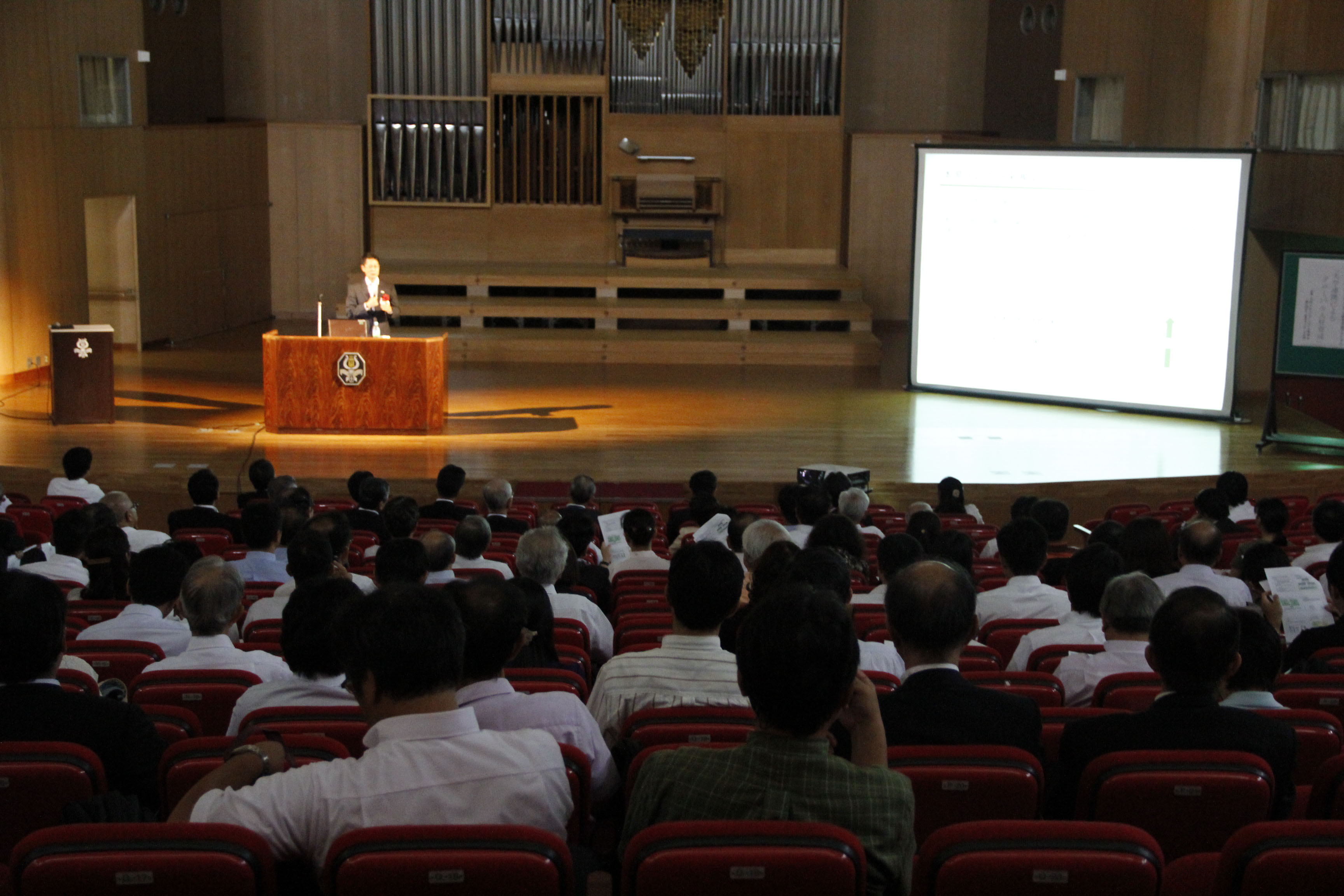
- ▽ Symposium
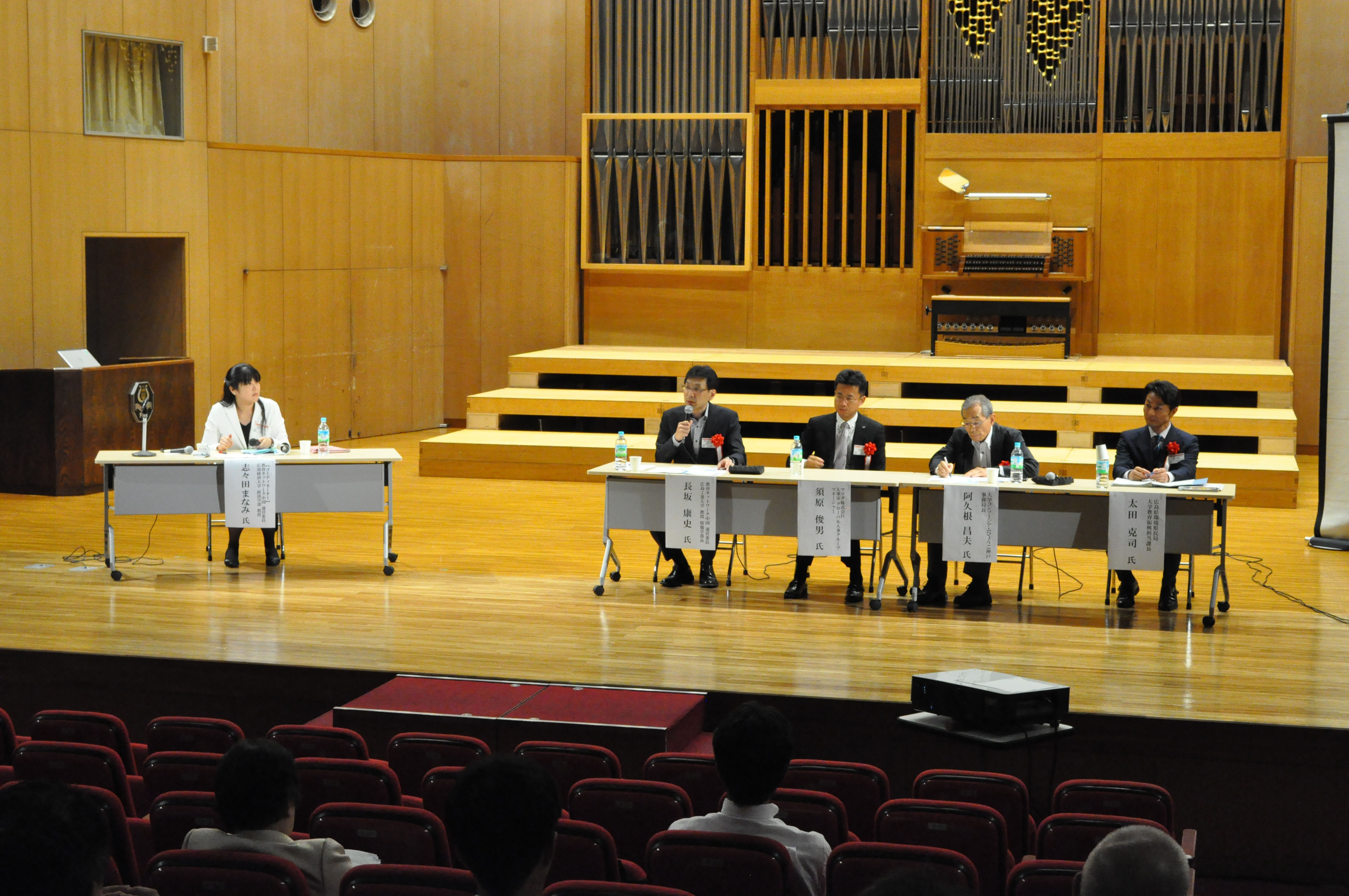
In addition, at the symposium, from the standpoints of governments, companies, and universities, three topics were presented: “Initiatives for a new educational program through university collaboration: “Initiatives for the image of manufacturing engineers in the age of globalization,” “Efforts to develop global human resources in companies,” and “Global human resource development projects of the University Consortium Hyogo Kobe.” In the discussion that followed, there was a lively discussion on human resource development initiatives.
In the subsequent report on education administration, Mr. Yoshihiko Tsunoda, Director of the University Promotion Division, Higher Education Bureau, Ministry of Education, Culture, Sports, Science and Technology, reported on trends in higher education policy.
In addition, at the poster session held in parallel with the symposium, each consortium organization and three companies, Shimizu Corporation, Japan System Technology Co., Ltd., and Muroo Systems Co., Ltd., exhibited, and many questions and impressions were raised by the participants about their respective initiatives, and there was a scene where exhibitors and participants actively interacted.
- ▽ Education Administration Report
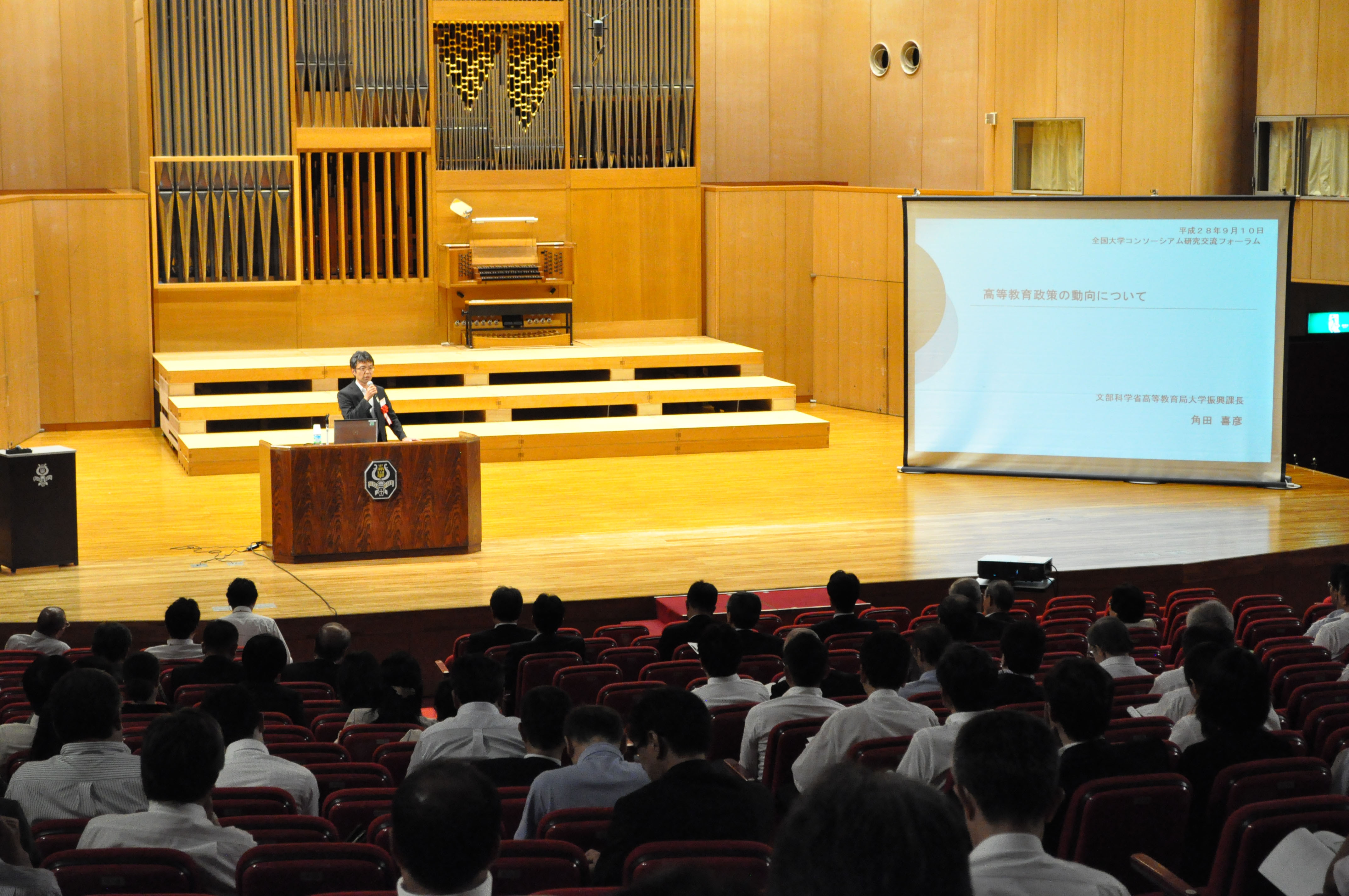
- ▽Poster Session (20 exhibitors)
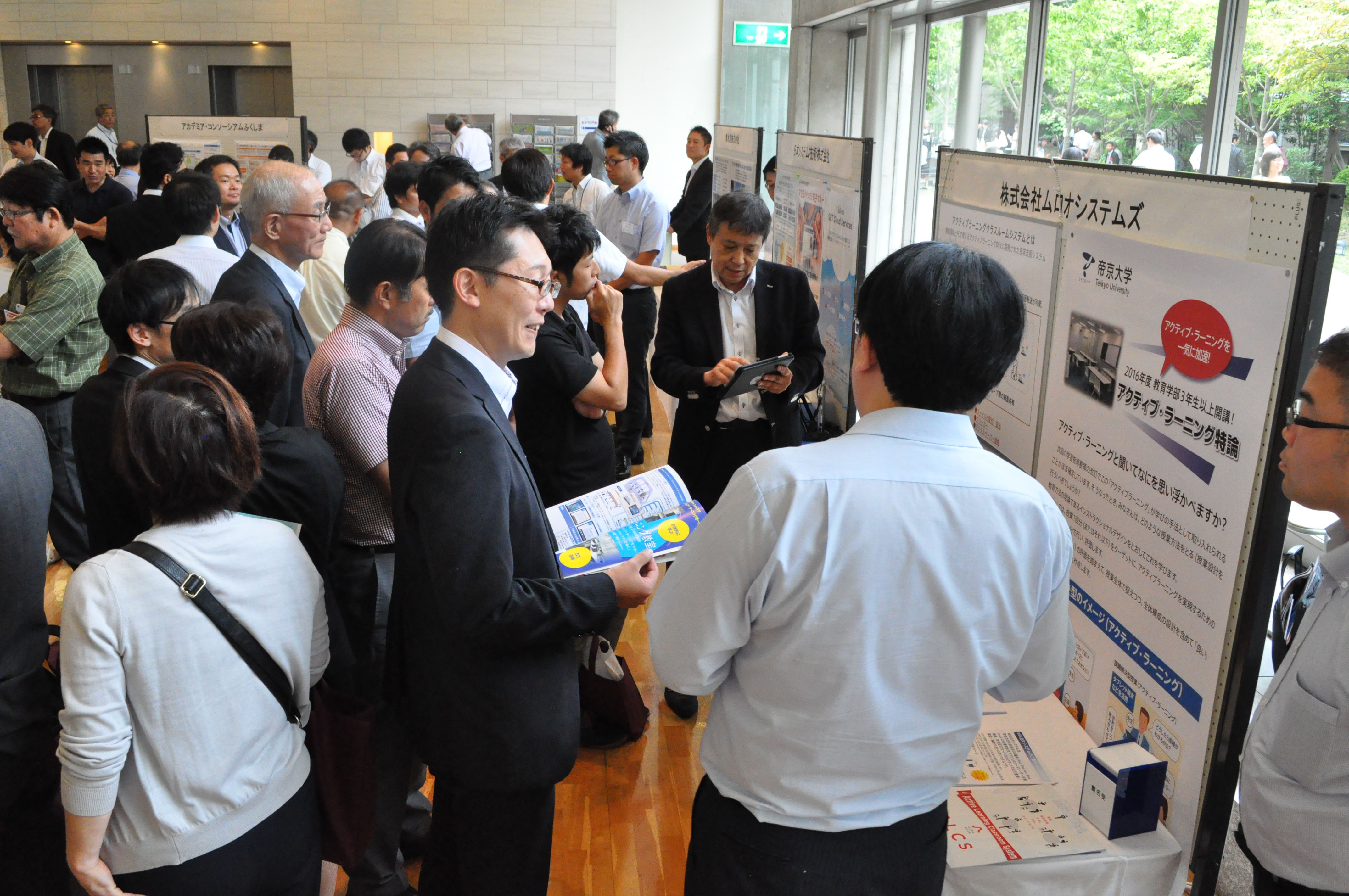
On the second day, four subcommittees were held on various themes related to collaboration between universities and universities, including “Methods and Issues for Fostering ‘Global Human Resources’ that Can Be Truly Accepted in Society,” “Exploring FD and SD through University Collaboration in Response to Changes in the Environment Surrounding Universities,” “Current Status and Future Approach of Regional Collaboration Projects,” and “Employment and Career Support for International Students.” Practical case reports and exchanges of opinions with participants were held.
- ▽ Breakout sessions (4 subcommittees in total)
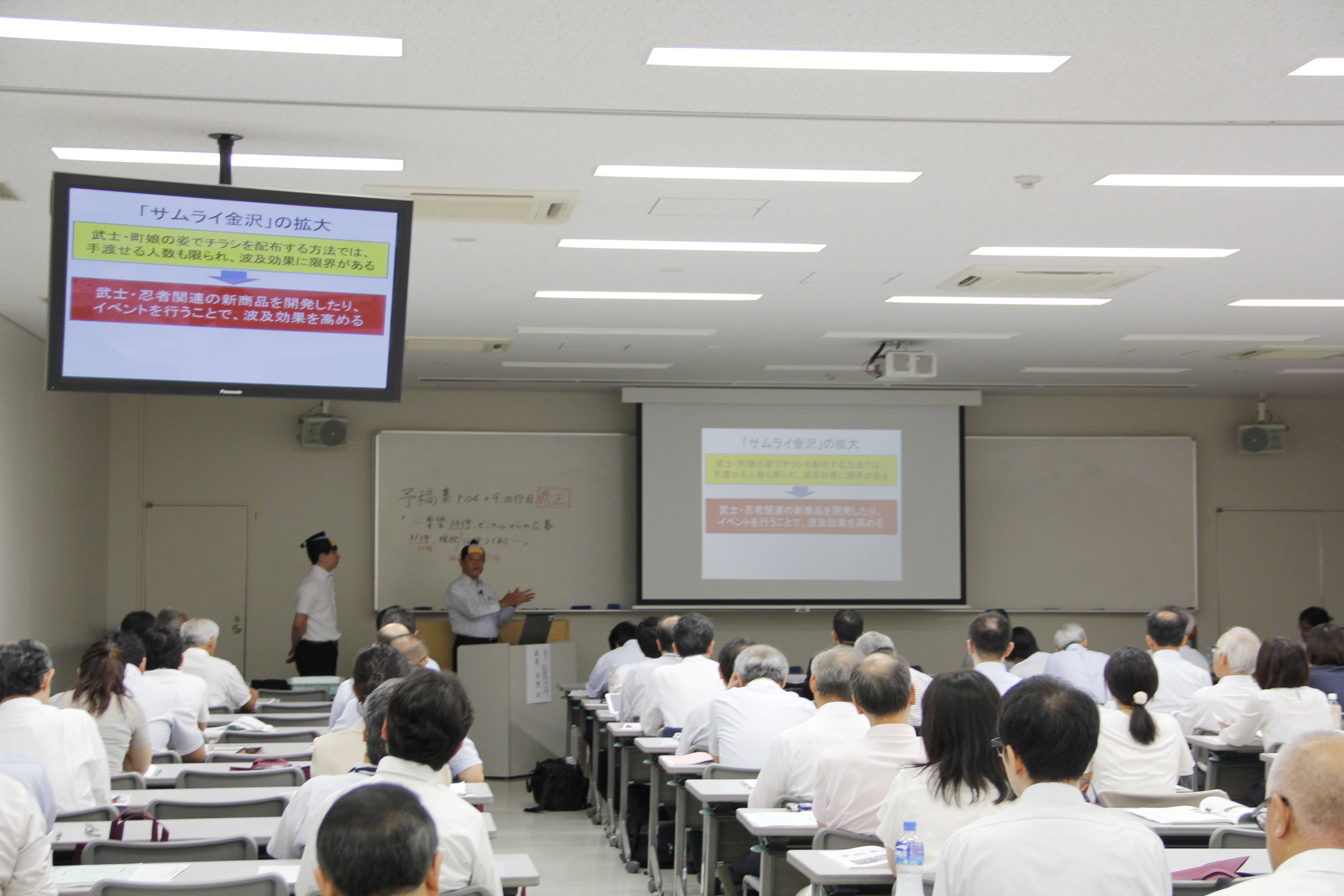
The next 14th forum is scheduled to be held in Okinawa in October 2017. Details will be announced on the website of the University Consortium Kyoto as soon as they are decided.
We hope you will consider joining us.














